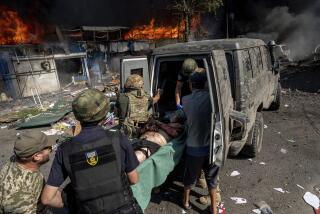1930s Redux in Bosnia : The international community allowed the aggression of that era to continue unchecked. Are we repeating the same mistake now?
- Share via
NEW HAVEN, CONN. — The international attempt to curb the murderous program of the Serbs in Bosnia and facilitate a peaceful settlement appears to be over. The United States, the North Atlantic Treaty Or ganization and the United Nations are close to capitulating to defiant use of brute force by the aggressors. The message delivered to the victims, the Muslims of Bosnia, is that they must either surrender and accept whatever shred of autonomous territory, if any, the Serbs will permit or suffer more death and starvation with no hope of outside succor.
This sickening situation is similar in many respects to the pitiful and portentous failure of the League of Nations, predecessor to the United Nations, and of major governments to deal with aggression, violence and contempt for international obligations in the 1930s. Those who would dismiss the tragedy in Bosnia as of no consequence except to the Bosnians should be required to study the earlier disgrace and ponder its consequences.
The debacle of the 1930s involved four events: the failure of the League of Nations to have the slightest effect on Italy’s conquest and annexation of the independent nation of Ethiopia; the acquiescence by Britain and France of the illegal military occupation of the Rhineland by Adolf Hitler’s Germany; the passive acceptance of the overthrow, aided by Nazi Germany and Fascist Italy, of the Spanish government by Gen. Francisco Franco, and the infamous appeasement at Munich, where Hitler was allowed to seize part of Czechoslovakia. The United States played a minor role in the events of the 1930s, not being a member of the League of Nations and with isolationist congressional and public opinion viewing events in Europe as of no concern to America. But if today’s trends continue, that difference between then and now may diminish.
Italy’s attack on Ethiopia, in 1935, was unequivocal aggression. The League of Nations did impose an embargo on arms sales to Italy--which had all the arms it needed--but did not block the delivery of oil, the one commodity that could have crippled the Italian attack. Italian forces used tanks, air power and poison gas against untrained and ill-equipped Ethiopians. In spite of Ethiopia’s eloquent pleas in the League of Nations, the British and French governments decided it was more important to stay on good terms with Italy than to save a backward, uncivilized African nation. In 1936, the conquest was complete--and the League of Nations was dead, for all practical purposes.
Hitler’s March, 1936, military occupation of the Rhineland, the region between the eastern border of France and the Rhine River, did not involve the use of lethal force, but its strategic consequences were immense. In 1925, Germany had willingly agreed that the Rhineland would not be fortified--thereby avowing an intention not to commit aggression against its neighbors. If Germany violated the treaty, Britain and France had a right to resist with force. But Hitler believed Britain and France were spineless and would accept a fait accompli even though they were militarily superior to Germany at the time. He was right. There was hand-wringing in London and Paris--but nothing more. Hitler’s gamble was successful and he was emboldened to press on with rearmament and further challenges to international order.
The year 1936 also saw the outbreak of the Spanish Civil War, with Franco’s attack on the republican government in Madrid. Franco was well-armed with German and Italian weapons and assisted by German and Italian “volunteer” troops. The British and French, however, sought to isolate themselves from the conflict by forbidding arms deliveries or other assistance to the contending sides in Spain. The result was similar to the arms embargo for Bosnia in the 1990s: The victim was denied arms, the aggressor was well-equipped.
The United States participated in the arms embargo not by international agreement but through a law forbidding the export of arms to any nation engaged in international or civil war. The only outside assistance to the Spanish government came from the Soviet Union and from communist and other left-wing international volunteers. Neither side would consider serious negotiations for a peaceful settlement, and the killing went on and on--until an estimated million lives were lost before Franco’s triumph in January, 1939.
Meanwhile, the best known of the four events took place in Munich in September, 1938, where the British and French governments, intimidated by Hitler’s threat to go to war to seize a large part of Czechoslovakia, gave what was not theirs to give. Czechoslovakia was partitioned. A few months later, Hitler took the rest of Czechoslovakia, and a year later, he attacked Poland and ignited World War II.
Of course, the parallels between the 1930s and the 1990s are not exact. The ruthless methods of the Serbs are similar to those of Nazi Germany, but the Serbs, in themselves, are not a threat to the security of Europe, as a whole. But neither was Italy’s conquest of Ethiopia, nor the militarization of the Rhineland, nor the blood bath in Spain, nor the elimination of Czechoslovakia. British and French politicians in the 1930s saw these events as separate, regrettable but not as catastrophic. They congratulated themselves for containing the spread of violence--until they were overwhelmed by the greatest violence of the 20th Century.
Ten or 20 years from now, the failure in Bosnia may be recalled with the same despair as were the events of the 1930s during and after World War II. The historians of the next century may write that the triumph of Serbian aggression, confirmed by the withdrawal of NATO and U.N. forces and by the incoherence of U.S. policy, was a dark turning point.
They may have to write that Bosnia was followed by the self-destruction of the United Nations as an instrument for the prevention and punishment of aggression, and the return of the United States to irresponsible isolationism. They may have to chronicle a succession of Bosnias perpetrated by people ready to find rewards through killing others, with violence spreading and coalescing across Eastern Europe, the former Soviet Union, Africa and the Middle East--violence employing ever more destructive weapons.
Such a horrible scenario is obviously speculation. The Bosnian example may not occur elsewhere. But for leaders to dismiss the possibility, to do nothing to engage the citizenry of all countries in serious discussion leading toward a willingness to act, is to make horror more likely. A city built of tinderbox homes and without a fire department may escape a great fire. Just don’t count on it.
The first step toward a resolution in Bosnia should be to take all necessary steps for the fulfillment of the peace plan proposed earlier this year by the United States, Britain, France, Germany and Russia--and accepted by the Bosnian government. This means resolute rejection of the fatalistic arguments that it is too late to save the victims of aggression in Bosnia, or that domestic political constraints in the United States and the other NATO countries are insurmountable, or that the United States and Western Europe should not risk discord with Moscow, or that the United Nations is the problem and not the solution. Rejecting fatalistic arguments requires that leaders, parliaments and general publics be aware of how their counterparts in the 1930s behaved and with what consequences.*
More to Read
Sign up for Essential California
The most important California stories and recommendations in your inbox every morning.
You may occasionally receive promotional content from the Los Angeles Times.













